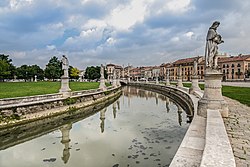Padua
Padua (Italian: Padova) is an Italian city near Venice. It has about 210,000 people.
| Città di Padova | |
 | |
| Country | Italy |
| Region | Veneto |
| Province | Padua (PD) |
| Frazioni | Altichiero, Arcella, Bassanello, Brusegana, Camin, Chiesanuova, Forcellini, Guizza, Mandria, Montà, Mortise, Paltana, Ponte di Brenta, Ponterotto, Pontevigodarzere, Sacra Famiglia, Salboro, Stanga, Terranegra, Volta Brusegana |
| Government | |
| • Mayor | Sergio Giordani ([[List of political parties in Italy|PD]]) |
| Area | |
| • Total | 92.85 km2 (35.85 sq mi) |
| Elevation | 12 m (39 ft) |
| Population (31 October 2011) | |
| • Total | 214,125 |
| • Density | 2,306.14/km2 (5,972.9/sq mi) |
| Time zone | UTC+1 (CET) |
| • Summer (DST) | UTC+2 (CEST) |
| Postal code | 35100 |
| Patron saint | Saint Anthony of Padua |
| Saint day | June 13 |
| Website | www |


An old myth says that Padua was founded by the Trojan Antenore. There was a settlement since the 4th century before Christ. It got under Roman power in 215 B.C. In 426 A.D. Padua became destroyed by Attila. Narses reconstructed the city, but the Langobardes destroyed it a second time. Charles, the Great got Padua in 774 under power of the Francs, later the city joined the Holy Roman Empire of German Nation.
After struggles with Frederic Barbarossa it declared peace in 1177. In 1222 the second university of Italy was founded in Padua. The Gulfs got Padua in 1256, later the Republic of Venice got control about the city until Napoleon Bonaparte got it.
Padua Media
Remnants of Padua's Roman amphitheatre wall
The unfinished façade of Padua Cathedral
Clock tower and Lion of St. Mark, symbol of the 'Most Serene Republic'
Last Judgment by Giotto, part of the Scrovegni Chapel

